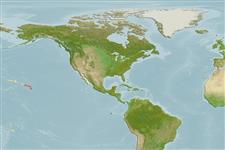Teleostei (teleosts) >
Ophidiiformes (Cusk eels) >
Ophidiidae (Cusk-eels) > Brotulinae
Etymology: Brotula: Latin, brotula, -ae = little, bud, shoot (Ref. 45335).
More on author: Fowler.
Environment: milieu / climate zone / depth range / distribution range
Ecology
Marine; reef-associated. Tropical; 28°N - 15°S
Pacific Ocean: Hawaii and Johnston Island.
Size / Weight / Age
Maturity: Lm ? range ? - ? cm
Max length : 75.0 cm TL male/unsexed; (Ref. 34024)
Short description
Identification keys | Morphology | Morphometrics
Inhabit shallow reefs (Ref. 1602). Benthic (Ref. 58302). Uncommon species (Ref. 34024). Oviparous, with oval pelagic eggs floating in a gelatinous mass (Ref. 205). Mature at 46 cm SL (Ref. 34024). Size of 18 cm SL given by Ref. 37816 seems in error.
Life cycle and mating behavior
Maturities | Reproduction | Spawnings | Egg(s) | Fecundities | Larvae
Nielsen, J.G., D.M. Cohen, D.F. Markle and C.R. Robins, 1999. Ophidiiform fishes of the world (Order Ophidiiformes). An annotated and illustrated catalogue of pearlfishes, cusk-eels, brotulas and other ophidiiform fishes known to date. FAO Fish. Synop. 125(18):178p. Rome: FAO. (Ref. 34024)
IUCN Red List Status (Ref. 130435)
Threat to humans
Harmless
Human uses
Tools
Special reports
Download XML
Internet sources
Estimates based on models
Preferred temperature (Ref.
123201): 24.5 - 29, mean 25.4 °C (based on 56 cells).
Phylogenetic diversity index (Ref.
82804): PD
50 = 0.5156 [Uniqueness, from 0.5 = low to 2.0 = high].
Bayesian length-weight: a=0.00380 (0.00154 - 0.00938), b=3.13 (2.91 - 3.35), in cm total length, based on LWR estimates for this (Sub)family-body shape (Ref.
93245).
Trophic level (Ref.
69278): 3.8 ±0.6 se; based on size and trophs of closest relatives
Resilience (Ref.
120179): Medium, minimum population doubling time 1.4 - 4.4 years (Preliminary K or Fecundity.).
Fishing Vulnerability (Ref.
59153): Moderate to high vulnerability (50 of 100).
